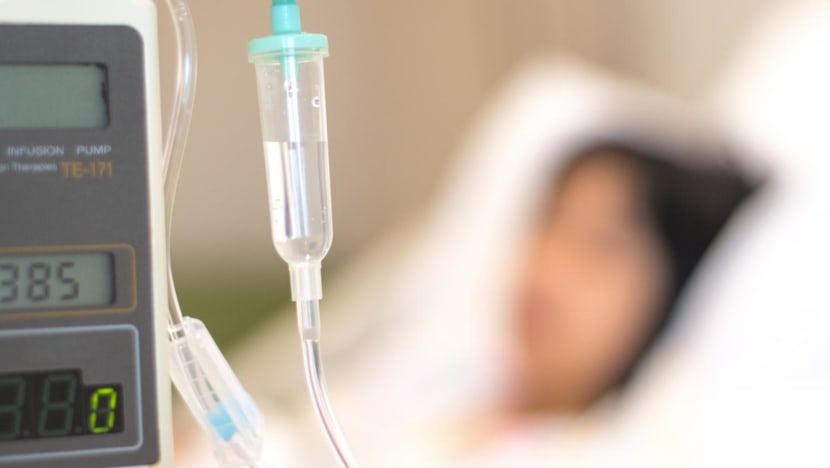Commentary: 'Curing cancer' is a loaded term
Cancer cases worldwide are set to jump by more than 75 per cent by 2050. Making treatment safer, more tolerable, and having access to drugs are ways to improve survival rates, says cancer specialist Dr Peter Ang from OncoCare Cancer Centre.

Crippling nausea, frailty and severe hair loss may be improved with new cancer therapies. (Photo: iStock/Pornpak Khunatorn)

This audio is generated by an AI tool.
SINGAPORE: When Kate Middleton, Britain’s Princess of Wales, recently revealed that she was undergoing treatment for cancer, it reignited conversations surrounding this disease.
Despite decades of research, significant advancements in treatment and remarkable breakthroughs in our understanding of the disease, the quest for a universal cure for cancer continues to elude us. Why is it so hard to find a cure for cancer?
Curing cancer is a loaded term to use in oncology.
Put simply, cancer cannot be treated with a single cure as it is not a single disease and doesn’t have a single cause. There are more than 200 types of cancer, and there is no one-size-fits-all treatment. Cancer cells can also become resistant to treatments and begin growing again.
As the world's population continues to grow, cancer cases are projected to rise. In 2022, about 20 million around the world received a cancer diagnosis while 9.7 million people died from cancer. According to the World Health Organization, more than 35 million new cancer cases are predicted in 2050, a 77 per cent increase from 2022.
THE BEST WAY TO BEAT CANCER IS PREVENTION
In Singapore, an average of 46 people were diagnosed with cancer daily and 16 people died of cancer each day from 2017 to 2021, according to the Singapore Cancer Society. One in four people may develop cancer in their lifetime.
Although the cancer survival rate in Singapore has increased to almost 60 per cent, 23.9 per cent of the 26,891 deaths in 2022 was caused by cancer - making it the leading cause of death in Singapore.
Improvements in cancer diagnosis, treatment and prevention continue to lead the way in reducing cancer deaths. The best odds for survival is detecting the cancer early in a premalignant stage so that it can be removed.
However, in many parts of the world, cancer is detected when the patient already has symptoms.
Historically, the primary treatment is to remove the cancer lump with surgery or destroy it with radiation therapy. Chemotherapy works by stopping or slowing the growth of all rapidly growing cells in the body, even if they are healthy, while targeted therapy attacks specific proteins on cancer cells.
However, tumours can recur or metastasize to sites distant from where the original tumour was. As such, adjuvant therapy is often used after primary treatment to remove unseen micrometastatic cancer cells to reduce the chance of cancer coming back.
USING OUR OWN IMMUNE SYSTEM TO FIGHT CANCER
A promising area of development in cancer treatment is immunotherapy, which uses the body’s own immune system to kill cancer cells.
It has been observed that in some cancers, spontaneous regression of the metastatic disease occurs although it is rare. Under the microscope, these cancer cells seem to have large numbers of immune cells around them. That was a clue that the immune system may be involved intimately in such cancers.
Our immune system comprises the white blood cells, the organs, and tissues of the lymph system, like the bone marrow. The immune system is massively powerful and the ability to harness this has seen significant improvements in survival rates in melanoma, kidney, lung, breast, and other cancers.
Immunotherapy has several interesting features. It may overcome resistance that happens with conventional chemotherapy. It has the potential to reach sanctuary sites such as the brain that medications may not penetrate well.
Unlike chemotherapy, immunotherapy can work for an extended period of time, sometimes after the treatment is stopped. This is because the body’s immune system “remembers” which cancer cells to look for and remains activated. Some cancers that do not respond well to conventional chemotherapy have a remarkable response with immunotherapy.
Immunotherapy studies have shown that median survival for patients with unresectable stage 4 melanoma increased from six months to almost six years.
Immunotherapy is also a promising option for a triple-negative breast cancer, a particularly aggressive group of invasive breast cancer that is oestrogen receptor-negative, progesterone receptor-negative and HER2-negative.
In a study published in The New England Journal of Medicine in 2020, researchers noted that the pathological complete response rate for patients treated with immune checkpoint inhibitor pembrolizumab in conjunction with chemotherapy was 64.8 per cent. This compared with 51.2 per cent for the group that was given a placebo with chemotherapy. A higher pathological complete response rate increases the likelihood of breast conservation and long-term survival.
Subsequently, the treatment was approved in October 2022 by the Health Sciences Authority in Singapore and added to the Cancer Drug List in March 2024. Breast cancer is the most common cancer in women in Singapore with more than 1,100 new cases a year. Triple-negative breast cancers accounts for 10 to 20 per cent of cases.
CONTINUED RESEARCH NEEDED
While immunotherapy offers hope for cancer patients, it is important to acknowledge that not all individuals will benefit equally from these treatments.
Immunotherapy medication is given as an intravenous infusion every few weeks. It can be associated with side effects although they may not be typical of what most patients would associate with chemotherapy such as nausea, vomiting or hair loss.
The side effects of immunotherapy are often related to immune activation, and some can be serious, necessitating early recognition and timely intervention.
For immune checkpoint inhibitors to work well, a healthy immune system is necessary and so the earlier use of such treatments might be better.
It remains to be seen if there will ever be a cure for cancer. But making treatment safer, more tolerable, and having access to drugs are ways to improve cancer cure rates. We can strive towards a future where cancer is no longer a feared diagnosis but a manageable condition.
Dr Peter Ang is a cancer specialist at OncoCare Cancer Centre.




















